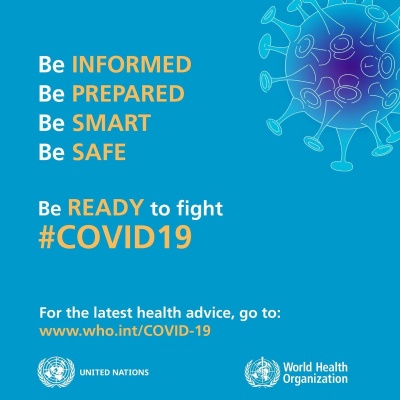Mental Health Tips during COVID-19

The buzz word for 2020 is "unprecedented" and the year is proving to be living up to the buzz word. With classes, lectures, work and more suspended indefinitely due to the COVID-19 pandemic, we are all learning to live in a very different world. A world that has stripped most of us from the warmth that comes with human interactions, and left us with our own minds to deal with. Firstly, you should feel no pressure to be productive, and I am sure you have heard this numerous times already. We are all living through a pandemic, it is something new for everyone. Do not feel the pressure to maintain the same rigorous schedule as you used to keep before the pandemic. What is important now, is your health - mental and physical - and below are tips sourced from the World Health Organisation, the University of Cape Town, the UK National Health Service and more.
1. Financial Wellbeing affects mental health
If you are worried about the status of your financial aid, scholarship, or state of employment and income during this time, contact the departments directly tasked with the issue. Contact your Human Resources department to find out the state of your employment and income during this time. Contact the Financial Aid office and scholarship funding entity to hear whether the delay in your studies will have an impact on your funding should you need require an academic extension. However, do note that the individuals and departments you are contacting are also going through the same uncertainty as you are, which means they may not have answers for you yet. But do start that conversation.
2. Stay Connected
We live in an age whether social media and technology have made it easier to keep in touch with loved ones without being in the same physical space as them. Connect with friends and family through social media platforms and video chatting apps. Check in periodically with each other, as this will allow you to have debrief sessions with your loved ones, and will keep you posted with how each person is doing. Again, do not feel pressure to be strong for people during this time, as this will become overwhelming for you as well. Share your fears, anxiety, thoughts, things that make you happy and keep you smiling. However, limit your time on social media as seeing the news stories - some true and some not - circulating on these platforms may lead to increased feelings of anxiety, fear and worry. Experts recommend limiting news intake to discrete, and brief, periods such as 30 minutes in the morning and/or 30 minutes in the evening.
3. Take Care of your body
Try to eat healthy, hydrate, exercise indoors and sleep regularly. Maintaining a regular sleeping schedule might be difficult during this time, but according to UCT's Department of Psychology Associate Professor Kevin GF Thomas, healthy sleep is important for emotion regulation, so it’s important to maintain your normal sleep habits. Do not use your bed for work or daytime reading – try to limit it to your regular night-time activities. Here is a fun 30minute indoor workout that you can try.
4. Manage your expectations
According to clinical psychologist, Desiree Dickerson,
"Do not underestimate the cognitive and emotional load that this pandemic brings, or the impact it will have on your productivity, at least in the short term. Difficulty concentrating, low motivation and a state of distraction are to be expected. Adaptation will take time. Go easy on yourself. As we settle into this new rhythm of remote work and isolation, we need to be realistic in the goals we set, both for ourselves and others in our charge."
Again, do not put pressure on yourself to write your dissertation or Extended Essay in one sitting, as this pressure to be productive can leave you feeling distressed. In order to manage these moments of distress, Desiree Dickerson states that you should,
"identify key thoughts or physical sensations that tend to contribute to your cycle of distress and feelings of being overwhelmed. Our thoughts (“Why can’t I concentrate?”), feelings (frustration, worry, sadness), physical sensations (tension, upset stomach, jitters) and actions (such as compulsively checking the latest COVID statistics) each feed into and amplify these negative emotional spirals. Addressing one aspect of this loop by, for example, actively reducing the physical symptoms (I use box breathing: breathe in for four counts, hold for four, breathe out for four and hold for four, then repeat) can de-escalate the cycle and help you regain control."
In conclusion, remember to take it easy on yourself.
Stay safe.
